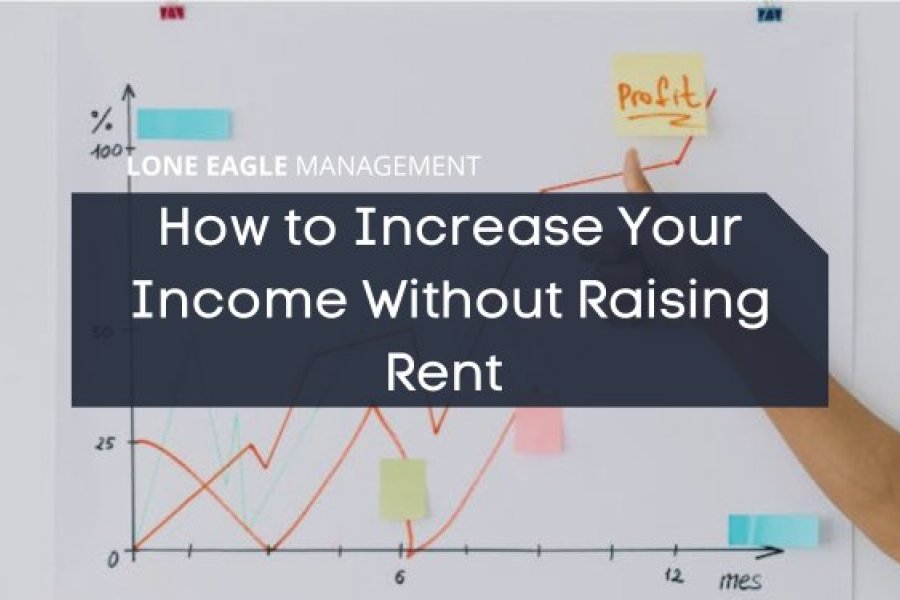
Owning rental property can be a lucrative venture if you do it right. It can provide you with a steady income and numerous financial benefits.
As a landlord, you have the potential to generate consistent cash flow every month, as well as help you build long-term wealth. That said, while raising rent may seem like an obvious way to boost profits, it's not always the best approach. Tenant turnover and legal restrictions can hamper your efforts to raise rent.
Fortunately, there are alternative strategies to increase rental income without resorting to higher rent. These can help you maximize returns while maintaining positive relationships with your tenants.
The following are proven tips on how to increase your income without raising rent.
Enforce Fees for Overdue Rent
Always penalize a tenant for paying rent late to discourage recurring late payments. The extra fee can boost your rental income and motivate tenants to pay on time. Make sure to abide by any local regulations to avoid potential legal issues.
Specifically, make sure to check whether your state enforces a mandatory grace period and/or a maximum late fee. If there is a mandatory grace period, then you must wait until it lapses before charging a late fee.
Charge Fees for Pets
You have various options for structuring pet-related charges as a form of insuring your property against potential damage. You can charge a non-refundable pet deposit. This can range from $100 to $300 per animal.

Another option is charging tenants refundable pet deposits. These are refundable at the end of the lease, minus any allowable damages. If making deductions, remember to provide the tenant with an itemized list of deductions for clarity.
You can also charge monthly pet fees. Just be sure to check the local regulations to know how much you can charge in your area.
Remember, though, that service and companion animals are not subject to pet fees or deposits. The Fair Housing Act classifies these as necessary accommodations for disabled individuals. You cannot restrict their size or breed.
Cultivate Relationships With Service Providers
Establishing strong connections with local vendors is crucial for efficient property management. Develop a network of reliable professionals who can address repairs promptly. Plumbers, electricians, and appliance technicians are essential contacts to have on speed dial.
Begin building these relationships gradually. Start by reaching out to reputable local businesses. When you hire them, communicate clearly and pay promptly. Show appreciation for quality work.
As you become a regular client, you can also discuss potential volume discounts. This can significantly reduce your maintenance costs over time.
Reliable vendor partnerships ensure quick responses to tenant issues. This can lead to an overall higher satisfaction for tenants and potentially longer tenancies. A win-win for everyone!
Maximize Storage Options
Boost your rental property's appeal by offering extra storage solutions. Consider charging a fee for access to storage in attics, basements, or sheds. This can increase your income without raising the overall rent.

Make the most of existing spaces too. Double up hanging rods in closets, add shelves and drawers where possible, and choose multi-purpose furniture with built-in storage. These simple upgrades can significantly enhance your property's storage capacity and attract long-term tenants.
Maximize Income With Furnished Rentals
Offering furnished rentals can boost your monthly income, despite the initial costs. This strategy may also provide tax benefits, as furniture is considered a depreciable asset by the Internal Revenue Service (IRS).
Providing furnished rentals has its downsides, though. They only appeal to a small niche of renters like students and expatriates. Also, your maintenance bill will more likely go up, as there will be more things undergoing wear and tear.
As such, make sure to weigh the pros and cons carefully. Your property's location and target market will play a huge part in whether or not to take this route. Of course, research local demand and pricing before investing.
Monetizing Tenant Subletting
Subletting can be a profitable opportunity for landlords. You can implement a fee structure for tenants who wish to sublet, typically ranging from $50 to $100 per subtenant. This extra income can offset potential risks associated with subletting.
However, it's crucial to develop a comprehensive subletting policy within your lease agreement. This can protect you from unforeseen liabilities and hidden costs that often accompany subletting arrangements.
A well-crafted policy will ensure both you and your tenants understand the terms and responsibilities involved.

Hire a Property Management Company
This is another way that can enable you to increase your income without raising rent. Partnering with a reputable property management company can help you boost your income by doing the following things:
- Charging optimal rent.
- Renting to quality tenants.
- Reducing your rental expenses.
- Doing timely repairs.
- Ensuring legal compliance to prevent potentially costly legal issues.
For savvy property owners, this is the ultimate solution for reduced stress and maximum return on investment.
Bottom Line
As you can see, you can increase rent without resorting to rent hikes. Rent hikes have the potential to make your property less desirable in the eyes of prospective and existing tenants. This is especially true if you make the hike without doing due diligence.
Ultimately, for reduced stress and maximum ROI, hire a property management company. Lone Eagle Management provides quality property management services to property owners in the counties of Union, Bergen, Somerset, and Morris in the state of New Jersey. Get in touch to learn more!